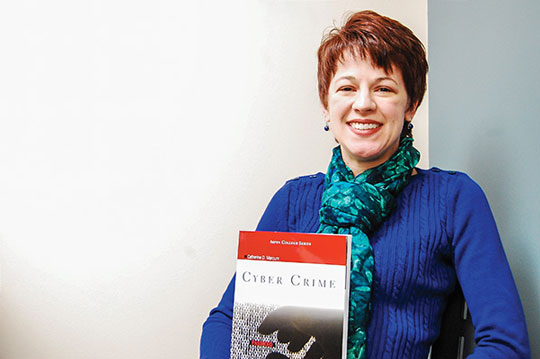Cathy Marcum, an assistant professor in the Department of Government and Justice Studies, wrote a book this year about how individuals use technology and the Internet to commit crimes.

The process of writing the book, titled “Cyber Crime,” took about a year, Marcum said.
Cybercrime has become more frequent than ever and is commonly seen in the media.
“It’s a tremendously important issue because Americans now spend more time on the Internet than they do watching television – better than 5 hours a day,” said Elicka Peterson, associate professor in the Department of Government and Justice Studies.
Marcum said, in the book, she looks at the various types of cybercrime, the legislations that punish it and some of the policies to combat it.
Although the original intent was not to write a book, Marcum was approached by her eventual publishing company, Wolters Kluwer, about interest in writing one, she said. She previously was doing a lot of research and had published articles and a few research studies on the topic.
There are multiple types of cybercrime, but there is a specific variety of cybercrimes that are more frequent among college-aged students or younger, Marcum said.
“Digital piracy is a very common example that college students do, like illegally downloading movies or music,” Marcum said. “Cyber bullying or stalking is in the news a lot, and is quite frequent, especially among adolescents.”
Marcum said another common act of cybercrime amongst the younger generations is hacking.
“Hacking is definitely one of the big ones, any unauthorized access, even something as simple as going into someone’s email or Facebook page, is a crime,” Marcum said.
Cybercrime is not limited by race, age or gender, but certain types of cybercrime are more prone to be committed by a specific category of people.
“Cybercrime can be committed by anyone,” Marcum said. “But more sophisticated means of cybercrime is more likely to be committed by a highly educated, college-aged, white male.”
The more sophisticated types of cybercrime Marcum is referring to includes financial data theft, hacking and phishing.
Phishing is a type of hacking that leads to identity theft. Emails are sent that appear to be from a business and when opened obtain personal information such as social security numbers, credit card numbers or bank account passwords.
Marcum believes the solution to cybercrime can begin with educational programs in schools, she said.
“Educational programs, especially in middle school and high school or even focused on college students, are important,”Marcum said. “A lot of children and young adults are not aware that they can be legally punished for cybercrime.”
Marcum said she believes programs about cybercrime, similar to the DARE program, a common program used in schools to warn against drug use, might be used eventually on a public school level.
Story: Nicole Caporaso, News Reporter
Photo: Dana Clarke, Staff Photographer

